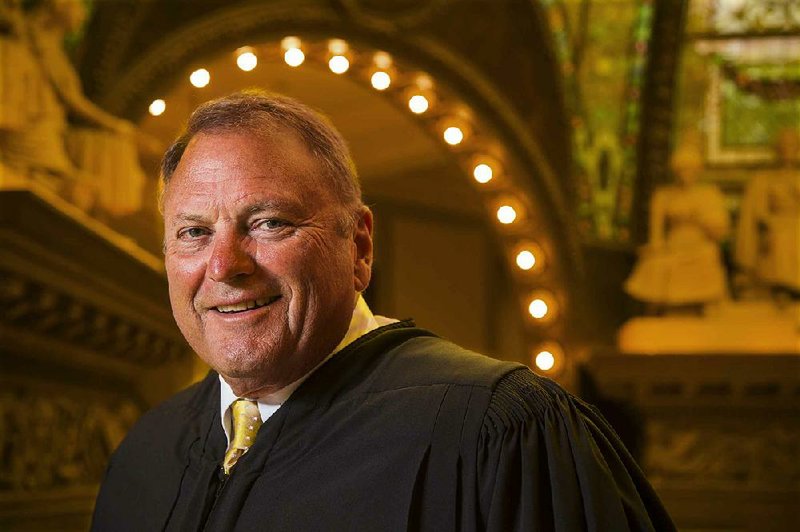For the second time, a Pulaski County circuit judge has ruled that a Jacksonville attorney is entitled to $323,267 for his work on a lawsuit that sought to stop state lawmakers from personally doling out public money to garner favor with voters.
Judge Chris Piazza ruled Wednesday that attorney John Ogles should be paid out of leftover state General Improvement Fund, or GIF, money for successfully representing former legislator Mike Wilson in the lawsuit.
Ogles' fee will come out of $969,800 left over from a $2.9 million allocation for the state program that was supposed to have been used for economic development grants in Faulkner, Lonoke, Monroe, Prairie, Pulaski and Saline counties.
Piazza ordered the remaining $646,533 to go back into state coffers, although there has been a question of whether Arkansas has any legal claim to the leftover funds.
GIF money is a collection of interest income and unspent tax revenue that's supposed to be used for economic development.
The Arkansas Supreme Court ruled in 2017 that the procedure used to hand out the GIF grants was too vague to satisfy the state constitution's requirement that each item of legislative spending be distinctly described.
Piazza first ruled that Ogles was due payment in March 2018, based on the attorney's contingency agreement to act as Wilson's lawyer in exchange for one-third of whatever they could recover. Both times the judge has declined to award the payment with interest.
State attorneys appealed that first payment decision, and last month, the state Supreme Court ruled that Piazza should have applied 29-year-old judicial guidelines, largely established by a 1990 high-court ruling, to decide whether Ogles, 57, was entitled to payment for the three years he has spent representing Wilson.
Piazza said Wednesday that the payment is justified under long-established judicial guidelines on court-awarded legal fees. Wilson's litigation has significantly benefited the public interest because the lawsuit established an important regulation on legislative spending with far-reaching consequences, the judge said.
"Their result is greater than this particular case," Piazza said.
The payment is one-third of the leftover $969,800 that was supposed to pay for economic development efforts in the six-county central Arkansas region.
If not for Wilson's lawsuit, the leftover funds would have paid for new restrooms in Ward's baseball park, an electric generator for the Cabot animal shelter, a jail in England and books for the Dolly Parton Imagination Library program in Pulaski County, among other things.
The grants were frozen when Wilson sued in February 2016, but spending resumed in November 2016 after Piazza rejected Wilson's arguments. Wilson and Ogles appealed his decision.
By the time the Supreme Court overturned Piazza's ruling on the legality of the grants in October 2017, all but $969,800 of the $2.9 million had been spent. The leftover money went into a court-administered fund for the judge to decide where the money should go.
At Wednesday's hearing, Brittany Edwards and Christine Cryer, lawyers for Attorney General Leslie Rutledge, disputed that Ogles should be paid anything. They argued that Ogles had not provided any real proof of how much his efforts were worth. They also told the judge that any legal work that Wilson had done in service to the lawsuit should be disregarded because legal clients are not entitled to be paid.
Wilson, also a lawyer, told the judge that he's not accepting any of the money awarded to Ogles, although he would like Ogles to reimburse him for the $18,714 of his own money he's spent pursuing the lawsuit.
Wilson served 12 terms as a Democrat in the state House of Representatives over 23 years in the General Assembly before leaving office in 1997. He has been fighting his former legislative colleagues in court over the way they have given away General Improvement Fund money since 2005.
Over the past 14 years, Wilson's war on GIF spending -- self-funded until now -- has required three lawsuits and taken the 74-year-old Jacksonville man to the state Supreme Court four times, where he's won every time. He retained Ogles for the third lawsuit, saying he hopes this suit can be his last.
Ogles told the judge Wednesday that the attorney general could have recouped as much as $120 million doled out statewide through GIF-funded economic development grants after the high-court ruled the money was improperly spent, but that Rutledge did not try to get any of the money back.
The state aggressively moved to give that GIF money away, and then Rutledge's lawyers disavowed any claim to the leftover money in court filings last year, he told the judge.
"They did everything they could to make sure this money could not come back to the state of Arkansas," said Ogles, appearing with law-partner son Will Ogles. "They wanted [grant applicants] to have it."
When Wilson sued in 2016, about $24 million in GIF dollars was divided statewide between eight multicounty "planning and development districts," each tasked with dispensing its share through grants awarded at the recommendation of legislators.
Wilson called the grant program a "money-laundering machine" for lawmakers to fund pet projects in their districts to win political points with supporters. Defenders of the grant program denied Wilson's accusations of improper legislative influence, describing his case as based on defamation and innuendo.
His lawsuit affected only the $2.9 million single-year disbursement by the Lonoke-based Central Arkansas Planning and Development District.
Gov. Asa Hutchinson declared the GIF program "history" in 2018, but said he was open to some other form of state aid to meet communities' "unique needs."
In February, the governor signed Senate Bill 155 into law as Act 82, creating the Development and Enhancement Fund to receive funds that would have previously gone to the General Improvement Fund.
Metro on 06/20/2019
